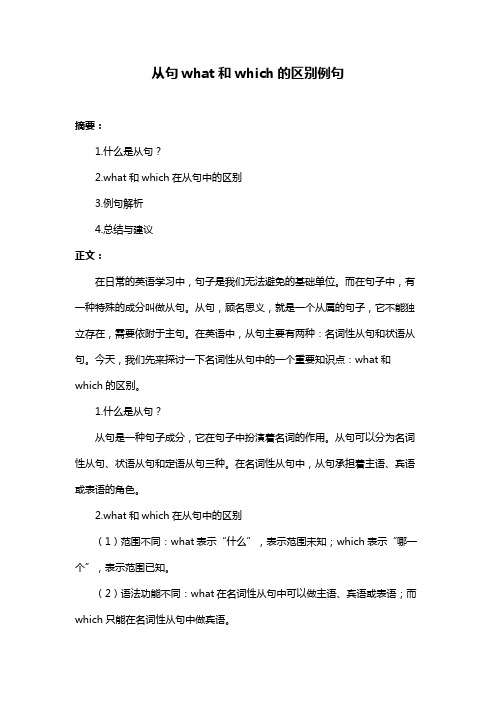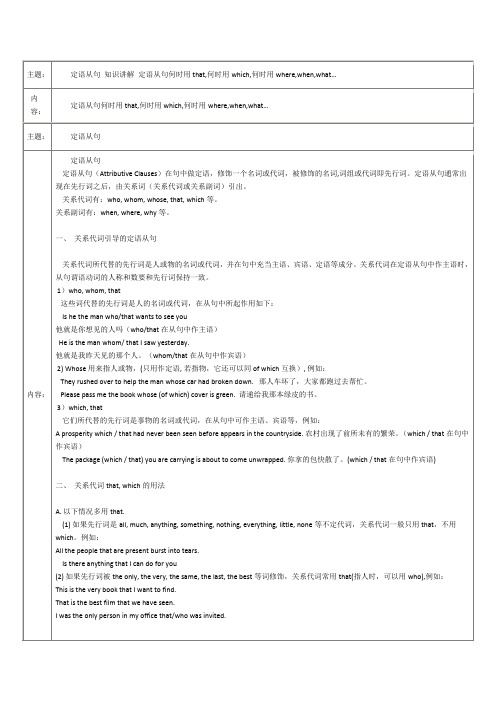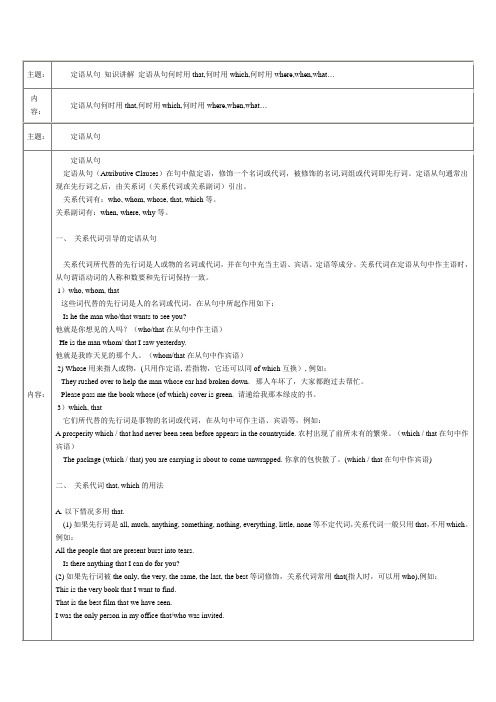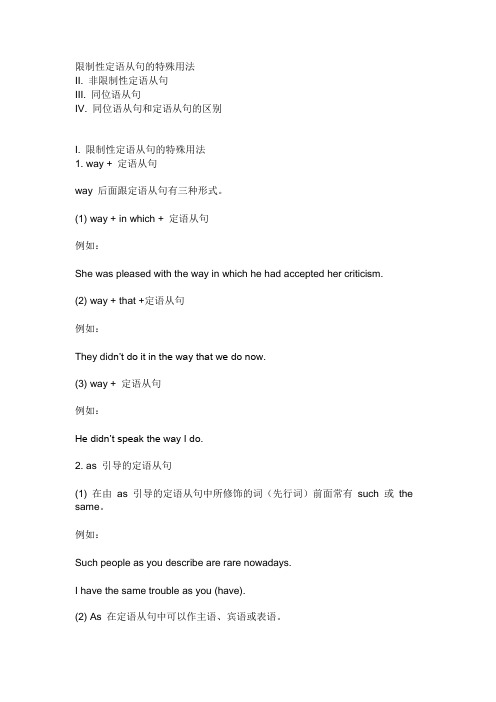what从句定语从句
从句what和which的区别例句

从句what和which的区别例句
摘要:
1.什么是从句?
2.what和which在从句中的区别
3.例句解析
4.总结与建议
正文:
在日常的英语学习中,句子是我们无法避免的基础单位。
而在句子中,有一种特殊的成分叫做从句。
从句,顾名思义,就是一个从属的句子,它不能独立存在,需要依附于主句。
在英语中,从句主要有两种:名词性从句和状语从句。
今天,我们先来探讨一下名词性从句中的一个重要知识点:what和which的区别。
1.什么是从句?
从句是一种句子成分,它在句子中扮演着名词的作用。
从句可以分为名词性从句、状语从句和定语从句三种。
在名词性从句中,从句承担着主语、宾语或表语的角色。
2.what和which在从句中的区别
(1)范围不同:what表示“什么”,表示范围未知;which表示“哪一个”,表示范围已知。
(2)语法功能不同:what在名词性从句中可以做主语、宾语或表语;而which只能在名词性从句中做宾语。
(3)引导词不同:what引导名词性从句;which引导定语从句。
3.例句解析
(1)请问你要什么(what do you want)?
(2)在这家餐厅里,我最喜欢吃的菜是哪一个(which dish do I like best)?
(3)这个问题哪个答案是正确的(which answer is correct for the question)?
4.总结与建议
掌握好what和which的区别,对我们的英语表达和理解有很大的帮助。
在实际应用中,我们要根据句子的语境和语法结构,灵活选择合适的词语。
定语从句what的用法

定语从句中能不能⽤what?如果可以,那么⼤家知道怎么⽤?下⾯是店铺为⼤家整理的定语从句what 的⽤法,希望能够帮助到⼤家。
what是不能引导定语从句的.that可以引导定语从句. what只能⽤来引导名词性从句,⽐如主语从句,如:What he said was not ture.(他说的不是真的.)或者宾语从句,如:I don't believe what he said.(我不相信他说的话.)⽽定语从句属于形容词从句. (that可以引导的从句类型较多,只回答在定语从句中的⽤法.) that作为关系代词,引导定语从句,修饰其先⾏词.如:All that glitters is not gold.(发光的不都是⾦⼦)定语从句that glitters修饰先⾏词all,起形容词作⽤,所以定语从句属于形容词从句.在这句话中,that其实是代替了先⾏词all,在从句中作glitter的主语. that也可以在从句中作宾语,有时可以省略掉,如:The car (that) I hired broke down after five kilometers.(我租来的车五公⾥后就抛锚了.)that替代car,在从句that I hired中作hire的宾语. 你可以⽐较以下⼀组句⼦. What I said is true.我说的是实话.(what引导名词从句,在句中作主语,what前没有任何东西) All that I said is true.我说的⼀切是实话.(that引导定语从句,在句中作定语,all是先⾏词,that I said修饰all) 定语从句中能不能⽤what? 定语从句(Attributive Clauses)在句中做定语,修饰⼀个名词或代词,被修饰的名词,词组或代词即先⾏词.定语从句通常出现在先⾏词之后,由关系词(关系代词或关系副词)引出. 关系代词有:who,whom,whose,that,which等. 关系副词有:when,where,why等. 关系代词引导的定语从句 关系代词所代替的先⾏词是⼈或物的名词或代词,并在句中充当主语、宾语、定语等成分.关系代词在定语从句中作主语时,从句谓语动词的⼈称和数要和先⾏词保持⼀致. 1)who,whom,that 这些词代替的'先⾏词是⼈的名词或代词,在从句中所起作⽤如下: Is he the man who/that wants to see you? 他就是你想见的⼈吗?(who/that在从句中作主语) He is the man whom/ that I saw yesterday. 他就是我昨天见的那个⼈.(whom/that在从句中作宾语) 2) Whose ⽤来指⼈或物,(只⽤作定语,若指物,它还可以同of which互换),例如: They rushed over to help the man whose car had broken down.那⼈车坏了,⼤家都跑过去帮忙. Please pass me the book whose (of which) cover is green.请递给我那本绿⽪的书. 3)which,that 它们所代替的先⾏词是事物的名词或代词,在从句中可作主语、宾语等,例如: A prosperity which / that had never been seen before appears in the countryside.农村出现了前所未有的繁荣.(which / that在句中作宾语) The package (which / that) you are carrying is about to come unwrapped.你拿的包快散了.(which/that在句中作宾语) 关系副词引导的定语从句 关系副词可代替的先⾏词是时间、地点或理由的名词,在从句中作状语. 1)when,where,why 关系副词when,where,why的含义相当于"介词+ which"结构,因此常常和"介词+ which"结构交替使⽤,例如: There are occasions when (on which) one must yield.任何⼈都有不得不屈服的时候. Beijing is the place where (in which) I was born.北京是我的出⽣地. Is this the reason why (for which) he refused our offer?这就是他拒绝我们帮助他的理由吗? 2)that代替关系副词 that可以⽤于表⽰时间、地点、⽅式、理由的名词后取代when,where,why和"介词+ which"引导的定语从句,在⼝语中that常被省略,例如: His father died the year (that / when / in which) he was born.他⽗亲在他出⽣那年逝世了. He is unlikely to find the place (that / where / in which) he lived forty years ago.他不⼤可能找到他四⼗年前居住过的地⽅. 1)what = the thing which;whatever = anything What you want has been sent here. Whatever you want makes no difference to me. 2) who= the person that whoever= anyone who (错)Who breaks the law will be punished. (错)Whoever robbed the bank is not clear. (对)Whoever breaks the law will be punished. (对)Who robbed the bank is not clear. 3) that 和 what 当that引导定语从句时,通常⽤作关系代词,⽽引导名词性从句时,是个不充当任何成分的连接词。
定语从句what的用法

定语从句what的用法
what在定语从句中作为关系代词,用于引导出定语从句,修饰先行词,在从句中充当主语、宾语或表语等句子成分。
具体用法如下:
1. what引导定语从句时,在从句中充当主语,一般被省略。
例如:
I don't like what you said. (= I don't like the things that you said.)
2. what引导定语从句时,在从句中充当宾语,通常被省略。
例如:
I don't like what you said (about me).
3. what引导定语从句时,在从句中充当表语,通常被省略。
例如:
My opinion is what you said at the meeting.
需要注意的是,what在定语从句中不能用于引导非限制性定语从句,只能用于引导限制性定语从句。
此外,what在从句中一般不能用于单独的句子中,需要与限定词、代词或其他词语一起使用。
定语从句where,when,what,which用法

(4) 当先行词被序数词或形容词最高级所修饰时。
It is the first foreign book that I have ever seen.
This is the most beautiful flower that I have seen.
(错) I will never forget the days when I spent in the countryside.
(对) This is the mountain village (which) I visited last year.
(对) I'll never forget the days (which) I spent in the countryside.
Beijing is the place where (in which) I was born. 北京是我的出生地。
Is this the reason why (for which) he refused our offer 这就是他拒绝我们帮助他的理由吗
2)that代替关系副词
that可以用于表示时间、地点、方式、理由的名词后取代when, where, why和"介词+ which"引导的定语从句,在口语中that常被省略,例如:
Charles Smith, who was my former teacher, retired last year.
查理史密斯去年退休了,他曾经是我的老师。
My house, which I bought last year, has got a lovely garden.
非限制性定语从句what

⾮限制性定语从句what ⾮限制性定语从句what ⾮限定性定语从句:⾮限定性定语从句的作⽤是对所修饰的成分作进⼀步说明,通常和主句间⽤逗号隔开,将从句拿掉后部分仍可成⽴ 1. which引导的⾮限定性定语从句来说明前⾯整个句⼦的情况或主句的某⼀部分,that不能⽤于引导⾮限制性定语从句 例如: Her house,which was built a hundred years ago,stood still in theearthquake.(那座房⼦在地震中依然耸⽴,它是⼀百多年前建造的。
) 3. 有时as也可⽤作关系代词 4. 在⾮限定性定语从句中,⽤who, whom代表⼈,⽤which代表事物. 5.当先⾏词是专有名词或物主代词和指⽰代词所修饰时,其后的定语从句通常是⾮限制性的。
例如: Charles Smith, who was my former teacher, retired last year. 查理·史密斯去年退休了,他曾经是我的⽼师。
My house, which I bought last year, has got a lovely garden. 我去年买的的那幢房⼦带着个漂亮的花园。
This novel, which I have read three times, is very touching. 这本⼩说很动⼈,我已经读了三遍。
6.⾮限制性定语从句还能将整个主句作为先⾏词, 对其进⾏修饰, 这时从句谓语动词要⽤第三⼈称单数, 例如: He seems not to have grasped what I meant, which greatly upsets me. 他似乎没抓住我的意思,这使我⼼烦。
Liquid water changes to vapor, which is called evaporation. 液态⽔变为蒸汽,这就叫做蒸发。
定语从句 where,when,what,which用法

二、关系代词that, which的用法
A.以下情况多用that.
(1)如果先行词是all, much, anything, something, nothing, everything, little, none等不定代词,关系代词一般只用that,不用which。例如:
关系词的选择依据在从句中所做的成分,先行词在从句中做主、定、宾语时,选择关系代词(who, whom, that, which, whose);先行词在从句中做状语时,应选择关系副词( where地点状语,when时间状语,why原因状语)。
五、限制性和非限制性定语从句
1)定语从句有限制性和非限制性两种。限制性定语从句是先行词不可缺少的部分,去掉它主句意思往往不明确;非限制性定语从句是先行词的附加说明,去掉了也不会影响主句的意思,它与主句之间通常用逗号分开,例如:
His father died the year (that / when / in which) he was born.
他父亲在他出生那年逝世了。
He is unlikely to find the place (that / where / in which) he lived forty years ago.他不大可能找到他四十年前居住过的地方。
主题:
定语从句知识讲解定语从句何时用that,何时用which,何时用where,when,what…
内容:
定语从句何时用that,何时用which,何时用where,when,what…
三大从句中的what,that和 which

三大从句中的what, that和 which一.在名词性从句(主语从句、宾语从句、表语从句、同位语从句)中that 不充当任何句子成分,which 作定语,What 充当主语、宾语、表语等。
Eg:It so happens that I know the man. (主语从句)We have reason to believe that the fighting on the border may develop into a full-blown war.(宾语从句)The trouble is that we are short of money.(表语从句)The fact that she looked like a sensitive , kind girl didn’t matter.(同位语从句)I don’t know which class he is in.What he does doesn’t agree which what he says.二.在定语从句中,what 不能引导定语从句,只需区分 that和which。
1.that 的先行词既可以是人,又可以是物,而which 的先行词只能是物。
2.当先行词是物时,that 和which经常可以互换。
Eg:Do you still remember the days that/which we spent together?Is this the museum that/which we visited last year?3. 不可互换的情况:用that 不用which有8种情况:(1).当先行词被不定代词修饰或先行词本身是不定代词时。
不定代词有28个:every/no/any/some (thing one body) much many (a) little/few all both none neither either each 。
定语从句中引导词where,what,whom,whose,that,who的用法

限制性定语从句的特殊用法II. 非限制性定语从句III. 同位语从句IV. 同位语从句和定语从句的区别I. 限制性定语从句的特殊用法1. way + 定语从句way 后面跟定语从句有三种形式。
(1) way + in which + 定语从句例如:She was pleased with the way in which he had accepted her criticism.(2) way + that +定语从句例如:They did n’t do it in the way that we do now.(3) way + 定语从句例如:He didn’t speak the way I do.2. as 引导的定语从句(1) 在由as 引导的定语从句中所修饰的词(先行词)前面常有such 或the same。
例如:Such people as you describe are rare nowadays.I have the same trouble as you (have).(2) As 在定语从句中可以作主语、宾语或表语。
例如:Let’s discuss only such questions as concern everyone of us.(作主语)I never heard such stories as he tells.(作宾语)I’ve never seen such a clever man as he is.(作表语)(3) As 有时引导非限制性定语从句,可在定语从句中作主语、宾语、表语,修饰主句,常解释为正如、如同。
例如:As is known to all, the earth moves round the sun.(作主语)As was expected, he performed the task with success.(作主语)As he predicted, the wind changed.(作宾语)The meeting is very important, as indeed it is.(作表语)II. 非限制性定语从句1.非限制性定语从句由who, whom, which 引导(不可用that),还可以由whose, when, where 等词引导。
- 1、下载文档前请自行甄别文档内容的完整性,平台不提供额外的编辑、内容补充、找答案等附加服务。
- 2、"仅部分预览"的文档,不可在线预览部分如存在完整性等问题,可反馈申请退款(可完整预览的文档不适用该条件!)。
- 3、如文档侵犯您的权益,请联系客服反馈,我们会尽快为您处理(人工客服工作时间:9:00-18:30)。
e.g. ● There is not a single substance but has resistance to the flow of electrons. 没有哪一种物质对电子的流动是没有阻力的。 任何物质对于电子的流动都有阻力。 ● The specimen(样品) is in the form of a ring on whose surface the wire is wound. 样品的形式是在其表面上绕有导线的一个环。 ● In the electron tube, the negative electrode is heated to the point where it emits electrons. 在电子管中,负电极被加热到使它发射电子的程 度。
What a refrigerator does is remove heat from specific region and transport it elsewhere. 译文: 冰箱的功能是把某一特定区域的热量移走而把它 输送到别的地方。 ● In this case the magnetic moment (磁矩) of an electron would differ slightly from what it would be in a perfect vacuum. 译文: 在这种情况下,电子的磁矩与在真空中的磁矩稍 有不同。 ● What is well known is that light is a kind of electromagnetic wave. 译文: 众所周知,光是一种电磁波。
● These equations are special cases where x0 and t0 are both zero. 译文: 这些式子是x0和t0均为零的特殊情况。 ● The load is the place where the signal leaves a circuit. 译文: 负载就是信号离开电路的地方。 ● The circulatory system is the system whereby blood is pumped to all the body tissues. 译文: 血液循环系统是把血液输送到一切人体组 织去的系统。
b. “what” belongs to a compound relative pronoun 代表…“的”事;话;内容;东西;方向; 情况;原因等 What I have said / dealt with / covered / described / presented / treated: 我所讲述的内容…
Байду номын сангаас
6 In general, what we see is reflected light. 7 This concept will be introduced in what the author hopes is a clear and concise manner. 8 At that time, the mercury became what is now referred to as a superconductor. 9 What we call the weight of a body is really the attractive force which the earth exerts on the body. 10 The current in this branch has become 10 times what it was.
(2) When the connective acts as a prepositional object with the preposition at the end of the subclause e.g. ● Iron is one of the metals we are familiar with. 译文: 铁是我们最熟悉的金属之一。 ● The instrument we measure a body’s temperature with is called a thermometer. 译文: 我们用来测体温的器具称为温度计。
2. “that” and “which” can be exchanged on many occasions. On the following occasions “that” can not be replaced by “which” : (1) When the antecedent is : all, everything, nothing, something, anything All that one should do is to adjust the resistance. 译文: 人们所应做的就是调整一个电阻。 (2) The antecedent is modified by “only, no, very” or “ordinal numbers” The first thing that will be done is to … (3) The antecedent is modified by the superlative degree of adjectives
e.g. ● This device is what we need. 译文: 这个设备正是我们所需要的。 ● The relative velocity between the two is what makes the difference. 译文: 这两者之间的相对速度就是造成这种差别 的原因。 ● What we have is 4 Ω and 12 Ω in parallel. 译文: 我们得到的是4欧姆和12欧姆相并联。
3. The what-clause (1) common case a. “What” belongs to an interrogative pronoun:什么 / 怎么样 / 多大(尺寸,大小,数值等) e.g. ● It is necessary to find what force will be exerted on charge A. 必须求出多大的力将作用在电荷A上。 ● The purpose is to determine for what value of RL this PL is maximum. 目的在于确定RL为什么值时这个PL为最大。
1 It is necessary to know what units are used for measuring the quantity of heat. 2 This book tells the reader what electric circuits are and what we do with it. 3 This back emf is what opposes the current. 4 Force is what makes bodies move. 5 What this chapter describes is extremely important.
e.g. ● In what is to follow, we acquaint ourselves with some basic concepts. 译文: 下面我们要熟悉一些基本概念。 ● In what follows we will study whichever process is the most convenient to analyze. 译文: 下面我们将研究最便于分析的那种过 程。
Computers
are the most efficient assistants that man has ever had. 译文: 计算机是人类所曾有过的效率最高的 助手。
3. Occasions when a connective may be omitted (1) When the connective acts as an object in the sub-clause e.g. ● The amount of gravitational pull a body produces depends on the amount of material in it. 译文: 一个物体产生的万有引力的大小取 决于它所含物质的多少。
IV. Relative clauses 1. Connectives Relative pronouns: that / which / who / whose / as / but =which, who, that ~ not
Relative adverbs: where / why / when / as / whence / whereby / wherein / whereon
(2) A few special patterns a. What is called / termed / named / described as / known as / referred to as / spoken of as / + n. (complement)—所谓的…,人们所说的… b. In what is to follow / In what follows = In all that follows = In the following
d. What it is (was) / What they are (were) -- to stress e.g. ● The research institute is quite different from what it was five years ago. 译文:这个研究所跟五年前大不一样。 ● After a chemical change, a substance is changed to something different from what it was. 译文: 物质经过了化学变化就变成了与原来不同的某种东 西了。 ● The output of foundries (铸造业) in the UK shrank to one-third of what the industry was a decade ago. 译文: 英国的铸造业产量减少到10年前的三分之一。
